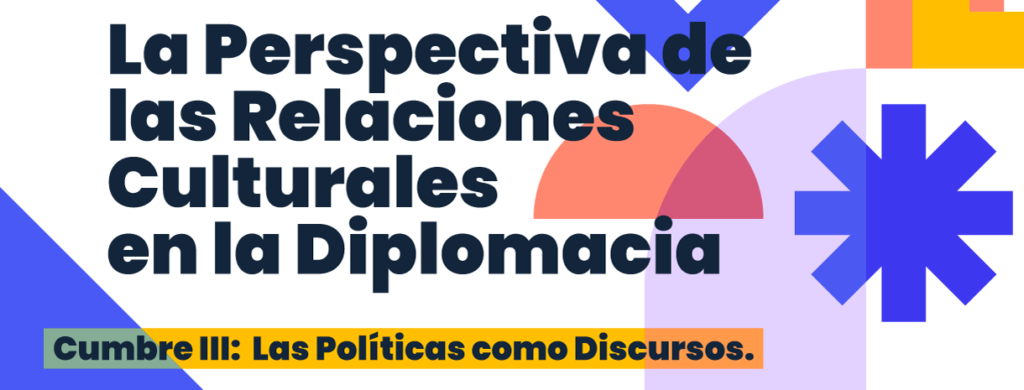<<Return to main Summit 3 page
Friday May 27, 2022
Virtual and In-Person at Centro Cultural Tijuana, Baja California Norte
The sessions also will be hosted on Zoom and streamed on Facebook Live. All keynote presentations and panels will use the same Zoom link, which will be emailed to you once you register for the event.
Session 3 Schedule
7:30 AM (PT) / 9:30 AM (CT) / 10:30 AM (ET)
Welcoming Remarks
Conveners:
- Vianka Santana. Director of the Centro Cultural Tijuana, CECUT-Ministry of Culture.
- Ricardo Castillo. Professor of International Relations, Universidad Iberoamericana.
- César Villanueva R. Associate Professor of International Relations, Universidad Iberoamericana.
7:45 AM (PT) / 9:45 AM (CT) / 10:45 AM (ET)
Concert- Mexican/Latinamerican Songs
Music has been an acclaimed aspect of cultural diplomacy, both as a state and a non-state sponsored activity. Anastasia Sonaranda is an example of the multiple routes an artist can take as a musical ambassador. Her work as a guitarist, composer, and singer has awarded her two grants from the National Fund for Culture and the Arts. She has collaborated with the National Institute of Anthropology and History as the Chief Coordinator of the Mexican Guitar project.
In this concert, Sonaranda, Anastasia’s music project, puts Mesoamerican cosmovisions at the front and center, as a way to promote peace and the preservation of Mexican and Latin American identity. Playing with tradition and innovation, Sonaranda, which means “el son que ara y anda”, serves as a reminder that culture is in constant evolution, but the essence of the tradition remains at the core of her artistic enterprise.
Performer:
- Anastasia Sonaranda. Artist and musician.
Host:
- Francisco Zepeda. Ph.D. Candidate, Queen’s University.
8:00 AM (PT) / 10:00 AM (CT) / 11:00 AM (ET)
Dialogue– De-centering cultural diplomacy: Representing Mexican architecture beyond the State in the inter(national) sphere.
Since the call of the United Nations Educational, Scientific and Cultural Organization (UNESCO) in the 1960s for member states to outline their cultural policies, architecture has been considered a field of identity expression. With the intention of illustrating cultural diplomacy as a critical practice or cultural relations, this dialogue presents architect Tatiana Bilbao, as non-state agent, to learn about divergent approaches to representation, that is, from her particular identities, experiences and her international (national) practice independent of the State / etc.
Participant:
- Tatiana Bilbao. Mexican architect, Tatiana Bilbao Estudio.
Host:
- María Montemayor. Ph.D. Candidate, Universidad Nacional Autónoma de México (UNAM).
9:00 AM (PT) / 11:00 AM (CT) / 12:00 PM (ET)
Keynote- The Politics of Migration on Culture
International mobility is one of the practices inherent to the human condition, which has tried to be regulated, accompanied or limited by state policies, which have sometimes been confronted or embraced by migrants. Today when it comes to talking about migration policies, a series of elements related to political, economic, technological and, of course, cultural issues must be considered. Mobility and associated politics cannot be considered if the importance of transnational identities, the reinterpretations of imagined communities and the role played by different actors, both state and non-state, are not considered in the establishment of new paradigms for understanding human mobility.
Keynote Speaker:
- Ambassador Marcela Celorio. Consul General of Mexico in Los Angeles.
Moderator:
- Vianka Santana. Director of the Centro Cultural Tijuana, CECUT-Ministry of Culture.
10:15 AM (PT) / 12:15 PM (CT) / 1:15 PM (ET)
Workshop- Food and integration from the south: Tortas, history and movies
Nuria Rangel, author of the book Antojitos. Mexican food and its relationship with emotions will merge two of the great pleasures that Mexican culture offers: cooking and cinema. During the workshop, Nuria will prepare a torta, seasoning the session with an explanation of the history of this emblematic dish of Mexican cuisine. The author will delve into the relationship of the torta with other cultural expressions, such as art and cinema. In general, this workshop is dedicated to explaining the integration process of Mexican gastronomy in the culinary cultures of the destination.
Facilitator:
- Nuria Rangel. Author and historian.
Moderator:
- Priscila Magaña. Assistant professor of International Relations, Universidad Iberoamericana.
11:15 AM (PT) / 13:15 PM (CT) / 14:15 (ET)
Closing remarks
Conveners:
- César Villanueva. Associate Professor of International Relations, Universidad Iberoamericana.
- Lynda Jessup. Vice-Dean of the Faculty of Arts and Science, Queen’s University and Director of NACDI.
- Nick Cull. Professor of Communication and Global Communication Policy Fellow, Center for Communication, Leadership, and Policy, University of Southern California.
- Eduardo L. Tadeo. Assistant Professor of International Relations, Universidad Iberoamericana.
